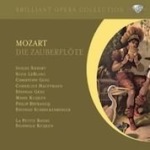This overlooked 2004 recording has a lot going for it, but it would not be a first choice for a Zauberflöte. The good news is that it’s charming: Sigiswald Kuijken’s touch, as one might guess, is light and airy, the period instruments are well and expressively played, the recording itself is vivid and bright. The singers are the lightest on CD–even lighter than Christie’s (Erato) and Gardiner’s (Arkiv). Indeed, if you find Hans-Peter Blochwitz’s Tamino for Christie a bit flimsy, he’s practically Mario del Monaco compared with Christoph Genz.
In fact, Genz is the major vocal drawback to this set–even among smallish voices (Marie Kuijken’s Papagena sounds like a boy soprano, for example), his unsupported tenor, white-toned and insubstantial, watery above the staff, proves no match for Tamino’s gorgeous, heartfelt music.
Others in the cast are much better within the scope of Kuijken’s reading. Cornelius Hauptmann also is very light for Sarastro, but he uses this drawback (at least it’s a drawback for me) to humanize him. And Kuijken’s fast tempos, even for both of Sarastro’s arias, take some of the mystery out of this character and place him in a more popular, fairy-tale realm.
Suzie LeBlanc’s Pamina is loveliness itself, rising to heights in “Ach, ich fühls”, though not erasing memories of say, Gundula Janowitz and several others. Stephan Ganz is an enchanting Papageno, quick on his vocal feet, joyous and cowardly by turns, and like the rest, always intimate. Isolde Siebert is a cautious but accurate Queen of the Night, singing with as much venom as her little voice will allow and animated in the recits.
Now, about those recits: Kuijken has included every word of dialogue and it is a trying experience. It also adds the need for a third CD (at Brilliant’s low price, this is not a matter of economics, but I bet it hampered the original release), and I suspect even the most avid Teutonophile will find it a problem. Not to mention the fact that there is no libretto! (Brilliant supplies a URL where you can find the texts.) Luckily, each semi-endless section (some are six minutes long) gets its own track, so remote control in hand, you can skip them–but it’s still a pain.
As suggested, Kuijken’s leadership is fleet and comic, the Three Ladies are sprightly and musical, and the Three Boys are from the Tölzer Knabenchor and are superb. This is a good, cheap set with a point of view; but for a really super “Flute” experience, the old Solti (Talvela, Lorengar, Burrows, Decca) and Klemperer (Gedda, Frick, EMI) are big-boned performances, the latter without any dialogue at all.
































